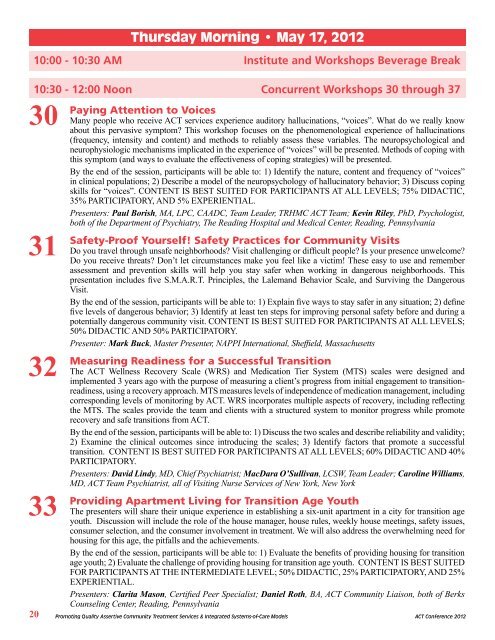2012 ACT Conference Brochure Online - Assertive Community ...
2012 ACT Conference Brochure Online - Assertive Community ...
2012 ACT Conference Brochure Online - Assertive Community ...
You also want an ePaper? Increase the reach of your titles
YUMPU automatically turns print PDFs into web optimized ePapers that Google loves.
31<br />
32<br />
33<br />
20<br />
Thursday Morning • May 17, <strong>2012</strong><br />
10:00 - 10:30 AM Institute and Workshops Beverage Break<br />
10:30 - 12:00 Noon Concurrent Workshops 30 through 37<br />
30<br />
Paying Attention to Voices<br />
Many people who receive <strong>ACT</strong> services experience auditory hallucinations, “voices”. What do we really know<br />
about this pervasive symptom? This workshop focuses on the phenomenological experience of hallucinations<br />
(frequency, intensity and content) and methods to reliably assess these variables. The neuropsychological and<br />
neurophysiologic mechanisms implicated in the experience of “voices” will be presented. Methods of coping with<br />
this symptom (and ways to evaluate the effectiveness of coping strategies) will be presented.<br />
By the end of the session, participants will be able to: 1) Identify the nature, content and frequency of “voices”<br />
in clinical populations; 2) Describe a model of the neuropsychology of hallucinatory behavior; 3) Discuss coping<br />
skills for “voices”. CONTENT IS BEST SUITED FOR PARTICIPANTS AT ALL LEVELS; 75% DID<strong>ACT</strong>IC,<br />
35% PARTICIPATORY, AND 5% EXPERIENTIAL.<br />
Presenters: Paul Borish, MA, LPC, CAADC, Team Leader, TRHMC <strong>ACT</strong> Team; Kevin Riley, PhD, Psychologist,<br />
both of the Department of Psychiatry, The Reading Hospital and Medical Center, Reading, Pennsylvania<br />
Safety-Proof Yourself! Safety Practices for <strong>Community</strong> Visits<br />
Do you travel through unsafe neighborhoods? Visit challenging or difficult people? Is your presence unwelcome?<br />
Do you receive threats? Don’t let circumstances make you feel like a victim! These easy to use and remember<br />
assessment and prevention skills will help you stay safer when working in dangerous neighborhoods. This<br />
presentation includes five S.M.A.R.T. Principles, the Lalemand Behavior Scale, and Surviving the Dangerous<br />
Visit.<br />
By the end of the session, participants will be able to: 1) Explain five ways to stay safer in any situation; 2) define<br />
five levels of dangerous behavior; 3) Identify at least ten steps for improving personal safety before and during a<br />
potentially dangerous community visit. CONTENT IS BEST SUITED FOR PARTICIPANTS AT ALL LEVELS;<br />
50% DID<strong>ACT</strong>IC AND 50% PARTICIPATORY.<br />
Presenter: Mark Buck, Master Presenter, NAPPI International, Sheffield, Massachusetts<br />
Measuring Readiness for a Successful Transition<br />
The <strong>ACT</strong> Wellness Recovery Scale (WRS) and Medication Tier System (MTS) scales were designed and<br />
implemented 3 years ago with the purpose of measuring a client’s progress from initial engagement to transitionreadiness,<br />
using a recovery approach. MTS measures levels of independence of medication management, including<br />
corresponding levels of monitoring by <strong>ACT</strong>. WRS incorporates multiple aspects of recovery, including reflecting<br />
the MTS. The scales provide the team and clients with a structured system to monitor progress while promote<br />
recovery and safe transitions from <strong>ACT</strong>.<br />
By the end of the session, participants will be able to: 1) Discuss the two scales and describe reliability and validity;<br />
2) Examine the clinical outcomes since introducing the scales; 3) Identify factors that promote a successful<br />
transition. CONTENT IS BEST SUITED FOR PARTICIPANTS AT ALL LEVELS; 60% DID<strong>ACT</strong>IC AND 40%<br />
PARTICIPATORY.<br />
Presenters: David Lindy, MD, Chief Psychiatrist; MacDara O’Sullivan, LCSW, Team Leader; Caroline Williams,<br />
MD, <strong>ACT</strong> Team Psychiatrist, all of Visiting Nurse Services of New York, New York<br />
Providing Apartment Living for Transition Age Youth<br />
The presenters will share their unique experience in establishing a six-unit apartment in a city for transition age<br />
youth. Discussion will include the role of the house manager, house rules, weekly house meetings, safety issues,<br />
consumer selection, and the consumer involvement in treatment. We will also address the overwhelming need for<br />
housing for this age, the pitfalls and the achievements.<br />
By the end of the session, participants will be able to: 1) Evaluate the benefits of providing housing for transition<br />
age youth; 2) Evaluate the challenge of providing housing for transition age youth. CONTENT IS BEST SUITED<br />
FOR PARTICIPANTS AT THE INTERMEDIATE LEVEL; 50% DID<strong>ACT</strong>IC, 25% PARTICIPATORY, AND 25%<br />
EXPERIENTIAL.<br />
Presenters: Clarita Mason, Certified Peer Specialist; Daniel Roth, BA, <strong>ACT</strong> <strong>Community</strong> Liaison, both of Berks<br />
Counseling Center, Reading, Pennsylvania<br />
Promoting Quality <strong>Assertive</strong> <strong>Community</strong> Treatment Services & Integrated Systems-of-Care Models <strong>ACT</strong> <strong>Conference</strong> <strong>2012</strong>




